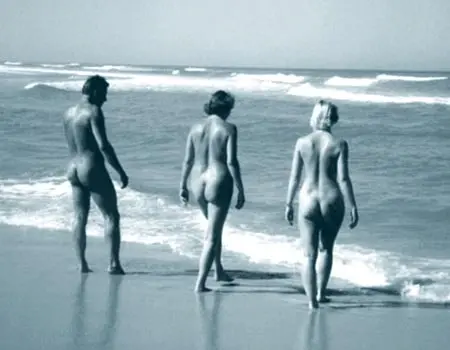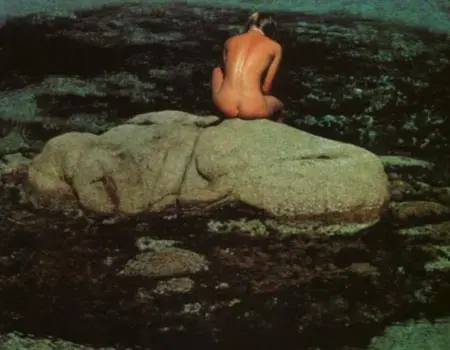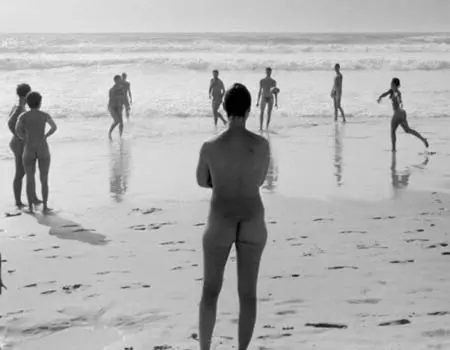Beyond Beauty and plainness
But as we said earlier, it is not easy to dismantle the whole system of subconscious conditioning that prevents the acceptance of nudity which, among other things, is the salvation and catharsis of the human body and the premise and condition for a new civilization.
It is, in the words of Erich Fromm -The edifying moment of being as opposed to the disappointing and deceptive moment of having.
In fact when we are nude we are only the masters of our own body, free from the blinkered dimension into which we have subconsciously fallen. Moreover, being nude changes our attitude towards reality and other people.
Furthermore there is the important element of recovering an adaptability that the state of nudity allows in situations where the excessive use of clothing has weakened some of our physiological functions, for example the thermoregulatory capacity of the skin.
Naturist nudism not only recuperates the -unusual- concept of simplicity but has the merit of re-educating human beings by re-elaborating the concept ofbeautiful and ugly by practicing nudity which allows equal dignity to the entire body and even to the parts, such as the genitals, which have been condemned as shameful and ugly. Naturism goes beyond beautiful and ugly because it goes beyond the sexophobic concept oftextile society.
Naturism allows human beings to rediscover that they are sexual beings and at the same time discover that other people are also sexual beings. Sex defines us and differentiates us, according to the principie of the complementarity of the two sexes because nature has the purpose of perpetuating the species.
Another merit of naturism is the fact that naturist nudism, by virtue of its capacity to increase and develop the perception of visual conscience disperses the physiological mystery associated with conception and birth (the existential versions of this obviously continue to remain as such). In this sense the educational contribution of naturism is vital, especially within the framework of naturist pedagogy for small children.
Back to the main theme we can say that, thanks to the practice of nudity the naturist conception regarding the body goes beyond beauty and ugliness because it does not associate the idea of nudity with sex or sex with the idea of coitus because these are the supposition and condition for an objectification and discrimination that lead to the separation of the body into different entities.
This objectification then differentiates the body into the noble parts (the mind) and the less-than-noble parts (the genitals).
Naturist nudity goes beyond the concept ofbeautiful and ugly because it considers the body as a holistic entity and as such not merely a sum of its parts. The body is a mystery, but its ontogenesis, with its preestablished and spectacular developmental stages (the fertilized egg, birth, growth, adulthood, deterioration and death) is naturally accepted by naturists and not rejected as it is by those who are not used to seeing the crudeness of the nude body.
Therefore naturist nudity, going beyond the concept of nude only if young and beautiful- accept the various developmental stages without any sort of repression. And we know that repression means removing, eliminating, even suppressing something that is unpleasant to our conscious mind without comprehending that sooner or later the subconscious wil/ overwhelm us with ali of its explosive force.
In fact nudity which naturism has laid down as the basic principle of its doctrine is not only a meeting with nature but also a meeting with our
own unconscious, the day of reckoning of our subconscious with our identity.
Wilhelm Reich wrote that neuroses manifest in the structures of the personality that are adverse to reality. In other words they are the result of conjlicts between internai and external needs.
And since the need for nudity is an internai need, we take for granted the conjlict that it causes in the external world which censures this need with a set of cultural, religious and aesthetic pretexts that are encoded as bans.
The resulting malaise, both psychological and physical, manifests with symptoms that arrive from the field of repressed emotions.
Reich continues by saying that the outcome of the conjlict is always a judgment of acceptance or condemnation by the criticai self.
In fact when we are nude we are only the masters of our own body, free from the blinkered dimension into which we have subconsciously fallen. Moreover, being nude changes our attitude towards reality and other people.
Furthermore there is the important element of recovering an adaptability that the state of nudity allows in situations where the excessive use of clothing has weakened some of our physiological functions, for example the thermoregulatory capacity of the skin.
Naturist nudism not only recuperates the -unusual- concept of simplicity but has the merit of re-educating human beings by re-elaborating the concept ofbeautiful and ugly by practicing nudity which allows equal dignity to the entire body and even to the parts, such as the genitals, which have been condemned as shameful and ugly. Naturism goes beyond beautiful and ugly because it goes beyond the sexophobic concept oftextile society.
Naturism allows human beings to rediscover that they are sexual beings and at the same time discover that other people are also sexual beings. Sex defines us and differentiates us, according to the principie of the complementarity of the two sexes because nature has the purpose of perpetuating the species.
Another merit of naturism is the fact that naturist nudism, by virtue of its capacity to increase and develop the perception of visual conscience disperses the physiological mystery associated with conception and birth (the existential versions of this obviously continue to remain as such). In this sense the educational contribution of naturism is vital, especially within the framework of naturist pedagogy for small children.
Back to the main theme we can say that, thanks to the practice of nudity the naturist conception regarding the body goes beyond beauty and ugliness because it does not associate the idea of nudity with sex or sex with the idea of coitus because these are the supposition and condition for an objectification and discrimination that lead to the separation of the body into different entities.
This objectification then differentiates the body into the noble parts (the mind) and the less-than-noble parts (the genitals).
Naturist nudity goes beyond the concept ofbeautiful and ugly because it considers the body as a holistic entity and as such not merely a sum of its parts. The body is a mystery, but its ontogenesis, with its preestablished and spectacular developmental stages (the fertilized egg, birth, growth, adulthood, deterioration and death) is naturally accepted by naturists and not rejected as it is by those who are not used to seeing the crudeness of the nude body.
Therefore naturist nudity, going beyond the concept of nude only if young and beautiful- accept the various developmental stages without any sort of repression. And we know that repression means removing, eliminating, even suppressing something that is unpleasant to our conscious mind without comprehending that sooner or later the subconscious wil/ overwhelm us with ali of its explosive force.
In fact nudity which naturism has laid down as the basic principle of its doctrine is not only a meeting with nature but also a meeting with our
own unconscious, the day of reckoning of our subconscious with our identity.
Wilhelm Reich wrote that neuroses manifest in the structures of the personality that are adverse to reality. In other words they are the result of conjlicts between internai and external needs.
And since the need for nudity is an internai need, we take for granted the conjlict that it causes in the external world which censures this need with a set of cultural, religious and aesthetic pretexts that are encoded as bans.
The resulting malaise, both psychological and physical, manifests with symptoms that arrive from the field of repressed emotions.
Reich continues by saying that the outcome of the conjlict is always a judgment of acceptance or condemnation by the criticai self.


































